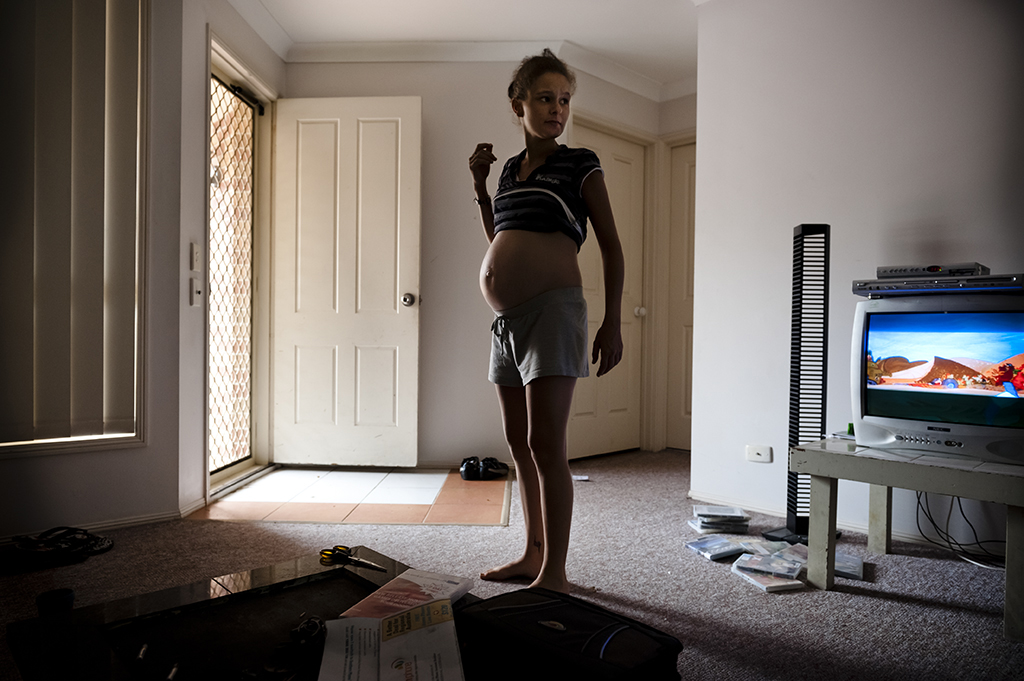
We Met a Little Early, But I Get to Love You Longer
Interview by
Raphaela Rosella
When my teenage twin sister told me she was pregnant I was angry; I called her a ‘slut’ and told her to get an abortion. I thought she could have a better life. But what is a better life? It was a path we were all expected to take. For many of my friends, becoming a mother was not a ‘failure of planning’, but a tacit response to the limited choices and opportunities available to us. ‘We met a little early, but I get to love you longer’, documents women in my life; my twin, my step-sister, and new and old friends, as they grapple with the complexities of motherhood and the turbulent environments around them. Each experience has been rewarding, complex, and at times heartbreaking. By listening and telling the stories of others, we come to understand that there are no stereotypes and we stand as individuals.

When my twin sister Mimi told me she was pregnant, I was angry. I called her a slut and told her to get an abortion. I thought she could have a better life, but what is a better life? I always knew at some stage in her life she was going to be a mum, I just hadn’t expected it to be so early in her life. She’s been depressed since she had Mikah. I always thought it was post-natal depression, but it never went away.

"I've never told anyone, but I miss him. Why did I have to do this? Mikah says, ‘I miss Dad. I wish Dad would come back.’ Why do I have to realise this when I have lost him. I was a selfish bitch. I'm the one that drove him away." Quote by Mimi

"He's full on. The paediatrician reckons he has challenging behaviour." Quote by Mimi

Mikah lies on the couch with his mum, who due to her depression spends most of her day sleeping.

Gillianne was 16 when she fell pregnant, one of the first of us. Now 24 and a mother to five, the sudden loss of one of her twin boys changed the Gillianne I once knew. I still remember the phone call. Lachlan was 11 days old when he left and now already a year has passed. I often wonder if she still cries when we’re all gone. I know she still grieves for him. I can’t imagine the pain will ever heal.

Gillianne sits in the backseat of a car with her eldest son, her daughter and our nephew Mikah. We’d just returned from the cemetery after visiting Lachlan’s gravesite for the one year anniversary of his passing.

"...I try and be the best mum as I can. My mum was a full-blown coke and heroin addict. I try to give my kids what she didn't give me. I don't like comparing myself to her because I feel like I'm putting her down, but I do what's best for my kids."

I asked Tammara if she got to speak to her son for his third birthday. She said, "I choose not to call him. DoCS (Department of Community Services) has made it too hard. They don't let me call Jessika either. It’s time to ignore the other two and start new with this kid. Hopefully one day they will want to know their mother." Quote by Tammara.

"The very first day after the court case they turned around and went to give her to me. I was sick, couldn't move, head cold, fucked up. I said, ‘Look I can't have her this weekend.’ I grabbed her anyways. An hour later I rang them up and said, ‘I can't really do this. Can you please come and grab her?’ They said, ‘Nah that's it, you don't ever get to see her again.’ I haven't seen her since. I actually gave up. I've never given up that easy in my life and on my daughter I did." Quote by Tammara.

The morning of Tammara’s scheduled caesarean.

"We're not here for you, we're here for Steven and the baby."- Tammara’s mother-in-law

Tammara with her daughter Tamika in their new home.
Raphaela Rosella (1988) is an Australian photographer working in the tradition of long-form documentary storytelling. Her work explores the lived experience of several young women facing social disadvantage in Australia.
Blending the conventions of documentary and art, Raphaela has spent over 8 years documenting women in her life as they grapple with the complexities of motherhood, violence, and turbulent relationships. Raphaela is committed to telling these stories in the hope that audiences begin to consider the complex and cyclical nature of social disadvantage, and acknowledge the resilience of young women who share this lived experience. In addition to her personal work, Raphaela works as a community artist and youth mentor with non-profit community arts and cultural development organisation Beyond Empathy. BE uses art to influence change in the lives of young people and communities experiencing recurring hardship.
Rosie has exhibited extensively including: Photoquai (France), Noorderlicht Photofestival (Netherlands) and Photo Ireland (Ireland). In 2014 she was one of 12 photographers selected worldwide to attend World Press Photo’s prestigious Joop Swart Masterclass held in Amsterdam. Furthermore, her work has received many distinctions including: First Prize (Portrait Singles Category) World Press Photo Contest (2015) and Australian Photobook of the Year (Momentro Pro) (2015).
Rosie holds a bachelor of Photography with first class honours from the Queensland College of Art (2012), a diploma of Community Services (Case Management) (2014) and is represented by Australian photo collective Oculi and throughout Europe by Agence Vu.
